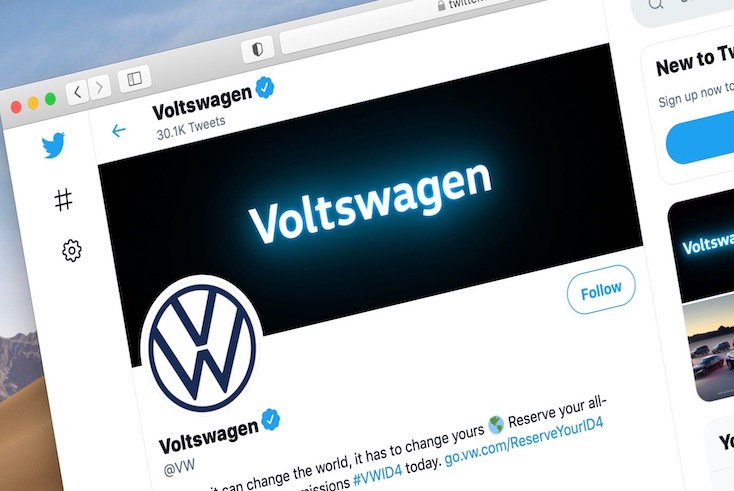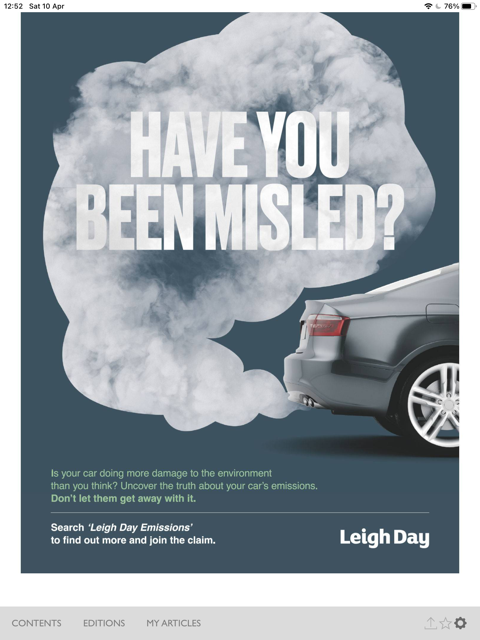Cookie options & ornithology; Plus jokes vs piss-taking

Dominic Mills catches up on cookie-less ad-tech and rebukes VW for playing with consumer trust (again)
Last week was busy in the ad-tech world as the scramble for alternatives to the third- party cookie intensifies.
Publicis announced that, via its Epsilon subsidiary, it was working with the Trade Desk on the so-called Unified ID 2.0 route; P&G was revealed to be working with Chinese platforms on tracking tech that would work around Apple’s privacy rules — and there’s a country that knows a lot about tracking; Pubmatic and OpenX are pursuing an option called SWAN; and Wunderman Thompson appears to be ploughing an entirely separate furrow with Resolve, which it calls “privacy-first personalisation technology that creates powerful customer experiences without third- party tracking”.
Hmm. It’s pretty confusing and the disjointed nature of many of these efforts suggests both a sense of panic and a lack of consensus about what to do.
Some focus on device fingerprinting, some on (as with Publicis) universal IDs and some on, well, I get lost in acronym city trying to understand my FLoC from my SPARROW and my PARRROT (yes, three Rs) — and no, I’m not making it up. Whoever devises these acronyms obviously has a thing for ornithology.
As usual with ad-tech, I suspect that confusion is part of the plan. I can understand the individual words, but when you put them together the fog descends.
It goes without saying that all this flailing around is pinned on the industry’s unswerving conviction that personalisation is the only way to go and that it’s what consumers want.
Yet it’s obvious also that a) Apple and Google will do their utmost to close down workarounds and b) more importantly, that the legislative direction of travel — i.e whether in the US, Europe and the UK — is the other way.
So why the industry doesn’t work out that maybe it’s time for a whole new approach defeats me.
Still, if you want an overview of the various options I can do no better than post you in the direction of a highly thoughtful and informative piece of work from VCCP Media — which it bills as an ‘explainer’ — titled The End of the Track for Tracking.
With simple language and in a refreshingly jargon- and hype-free manner, author and VCCP Media CSO, Steve Taylor, takes us through the options and their advantages (not many, I would say) and disadvantages.
FLoC, by the way, stands for Federated Learning of Cohorts, SPARROW for Secure Private Advertising Run Remotely on Servers and PARRROTT for Publisher Auction Responsibility Retention Revision of Turtledove — and Turtledove is itself, I think, yet another acronym for something even more complex. But I’ve lost the will to live so I’ll pass on that for now.
Readers of this column however, will have less choice than I.
The next time you’re preparing for a conversation with a client, media owner or techie, you can do no better than read VCCP’s explainer. And as Taylor concludes, “this is the end of tracking as we know it. But in our view, that’s probably not such a bad thing.”
Jokes v piss-taking
Imagine Tesco was to announce that all its burgers would no longer be made of beef.
In the future, consumers would have a choice of two types: plant-based or horse-meat. That would catch everybody’s attention.
Then it declared it was all a joke. How would the average Tesco consumer react?
Chances are they’d be bemused and not a little cheesed off. They wouldn’t be going “well, Tesco is a real hoot. Love that sense of humour, especially after that horse-meat stuff a few years ago”.
There’s jokes and then there’s taking the piss.
That I think, is at best where VW finds itself after the ‘Voltswagen’ episode in the US in which it put out an official announcement that it was changing its name to ‘Voltswagen of America’ — to mark its move into electric cars — and initially confirmed to reporters that it was not an April Fool’s joke and that the rebrand was going ahead.
And then declared it was a joke after all.
I didn’t really think too much about it until I read this piece in Marketing Week, which claimed it was a piece of highly effective marketing.
I’m all for contrarian views, but this is insane. To be honest, I’d got bored with addend’s obsession with April Fool’s jokes: they just weren’t funny.
The author’s theory is that the stunt was a perfect example of the fame strategy.
With one bound, the author claimed, VW had grabbed all Tesla’s oxygen. Better still, he says, VW got at least two bites of the cherry — as journalists first wrote it up and then had to go over it all again as it was retracted; plus an added bonus for tweaking journalists’ noses and making them look stupid.
[advert position=”left”]
You might expect me to say that it is not a good idea to lie to journalists, but it really isn’t. They won’t forget and they may well get their revenge. Certainly, the next time VW comes to them looking for PR, they won’t be kindly disposed.
But that is a sideshow really because the real crime VW has pulled is to show its disrespect to the consumer and all in pursuit of a not-very-funny joke or indeed a non-joke.
We may forgive the bad joke — although increasingly we don’t — but we don’t forgive the abuse of trust.
And this is a company that has committed the motoring world’s most egregious abuse of trust, which has cost it not just €31 billion in fines for Dieselgate but an incalculable loss of trust and reputation.
So why put all that at risk again for a joke? The thing about jokes is that when they’re built on shared humour they’re fine. When they take the piss out someone, they’re not.

Which brings me round nicely to the above ad I saw in The Times last week from the specialist firm of class-action solicitors Leigh Day, inviting owners of VW/Audi/Skoda/ SEAT diesels (among many marques) to join a group claim .
It doesn’t look like a joke to me.
Dieselgate clearly still haunts VW, which makes the idea that it might still wish to mess around with consumers beyond a joke.




